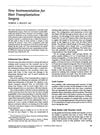July 2018 in “Current Analytical Chemistry” The method effectively detects minoxidil in hair-growth products.
 February 2018 in “InTech eBooks”
February 2018 in “InTech eBooks” Diagnosing and treating PCOS is complex due to differing criteria and requires a team approach.
[object Object] January 2016 in “Hair therapy & transplantation” Hair UpTM effectively and safely promotes hair regrowth, especially in minors.
138 citations,
March 2021 in “Journal of the American Academy of Dermatology” Ritlecitinib and brepocitinib effectively regrow hair in alopecia areata patients.
36 citations,
December 2021 in “The journal of allergy and clinical immunology/Journal of allergy and clinical immunology/The journal of allergy and clinical immunology” Two drugs, ritlecitinib and brepocitinib, improved scalp hair loss condition markers.
 20 citations,
March 2023 in “American Journal of Clinical Dermatology”
20 citations,
March 2023 in “American Journal of Clinical Dermatology” Baricitinib improved severe hair loss in adults over 52 weeks and was safe to use.
 13 citations,
December 2010 in “Nature Reviews Endocrinology”
13 citations,
December 2010 in “Nature Reviews Endocrinology” A young man with an eating disorder had a life-threatening adrenal crisis due to an autoimmune condition, highlighting the need for better education on managing hormone treatments.
9 citations,
January 2019 in “International Journal of Trichology” Combining calcipotriol with mometasone is more effective for treating alopecia areata than using mometasone alone.
 3 citations,
June 1998 in “Dermatologic Surgery”
3 citations,
June 1998 in “Dermatologic Surgery” New instruments were introduced to make hair transplantation surgery more precise and improve graft survival.
 2 citations,
July 2023 in “Journal of cosmetic dermatology”
2 citations,
July 2023 in “Journal of cosmetic dermatology” JAK inhibitors are more effective and safer for treating alopecia areata than dupilumab and apremilast.
 1 citations,
December 2022 in “Journal of cosmetic dermatology”
1 citations,
December 2022 in “Journal of cosmetic dermatology” The combination of vitamin D analogues with potent steroids is a favorable treatment for alopecia areata with fewer side effects.
 November 2024 in “Journal of Cosmetic Dermatology”
November 2024 in “Journal of Cosmetic Dermatology” Baricitinib is effective for severe alopecia areata but has some side effects.
 May 2024 in “International Journal of Cosmetic Science”
May 2024 in “International Journal of Cosmetic Science” Disulfide bonds are crucial for hair's strength, especially when wet.
 December 2023 in “Journal of Cosmetic Dermatology”
December 2023 in “Journal of Cosmetic Dermatology” Baricitinib effectively and safely improves hair growth in patients with severe alopecia areata.
 August 2024 in “Journal of Cosmetic Dermatology”
August 2024 in “Journal of Cosmetic Dermatology” Injectable treatments can effectively and safely improve hair growth in adults with androgenetic alopecia.
180 citations,
October 2019 in “British journal of haematology” Early detection and treatment of iron deficiency in pregnancy are crucial for maternal and infant health.
 30 citations,
September 2020 in “Journal of Patient-Reported Outcomes”
30 citations,
September 2020 in “Journal of Patient-Reported Outcomes” Alopecia Areata (AA) causes significant emotional distress, including feelings of embarrassment, depression, and anxiety, and impacts social interactions and daily activities.
 1 citations,
December 2022 in “JAMA Dermatology”
1 citations,
December 2022 in “JAMA Dermatology” The AI system HairComb accurately scores hair loss severity, matching dermatologist assessments.
February 2017 in “DOAJ (DOAJ: Directory of Open Access Journals)” Botulinum toxin type A did not help regrow hair in severe alopecia cases.
129 citations,
January 2004 in “Journal of medicinal chemistry” Researchers developed new compounds that target the androgen receptor effectively with fewer side effects.
 79 citations,
January 2018 in “Wiley Interdisciplinary Reviews-Developmental Biology”
79 citations,
January 2018 in “Wiley Interdisciplinary Reviews-Developmental Biology” Understanding how baby skin heals without scars could help develop treatments for adults to heal wounds without leaving scars.
24 citations,
September 2020 in “Pharmaceutics” Lidocaine-loaded microparticles effectively relieve pain and fight bacteria in wounds.
24 citations,
December 1997 in “Mayo Clinic proceedings” Carbamazepine may cause lung problems and lupus-like symptoms, which can improve after stopping the drug.
22 citations,
January 2017 in “Journal of steroid biochemistry and molecular biology/The Journal of steroid biochemistry and molecular biology” A new method accurately measures nine specific hormones in human blood.
[object Object] 4 citations,
February 2023 in “Frontiers in Oncology” Nano-Pulse Stimulation™ Therapy is more effective and less damaging than cryoablation for treating melanoma tumors in mice.
2 citations,
July 2022 in “BioMed Research International” Finasteride-loaded nanogels are effective, safe, and improve drug absorption through the skin.
 1 citations,
August 2024 in “Polymers”
1 citations,
August 2024 in “Polymers” Bacterial cellulose is a promising material for biomedical uses but needs improvements in antimicrobial properties and degradation rate.
1 citations,
May 2013 in “Hair transplant forum international” Non-classical 21 hydroxylase deficiency is an underdiagnosed cause of female hair loss and polycystic ovarian syndrome.
 October 2024 in “Cosmetics”
October 2024 in “Cosmetics” Afro-textured hair needs personalized care due to its unique genetic traits.
 August 2024 in “Frontiers in Public Health”
August 2024 in “Frontiers in Public Health” Alopecia Areata severely impacts mental health, causing anxiety and depression, affecting quality of life.















